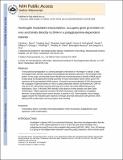| dc.contributor.author | Benn, C. L. | |
| dc.contributor.author | Sun, T. | |
| dc.contributor.author | Sadri-Vakili, Ghazaleh | |
| dc.contributor.author | McFarland, K. N. | |
| dc.contributor.author | DiRocco, D. P. | |
| dc.contributor.author | Yohrling, G. J. | |
| dc.contributor.author | Clark, Timothy William | |
| dc.contributor.author | Bouzou, B. | |
| dc.contributor.author | Cha, J.-H. J. | |
| dc.date.accessioned | 2017-05-15T19:00:15Z | |
| dc.date.issued | 2008 | |
| dc.identifier | Quick submit: 2013-06-06T23:48:09-04:00 | |
| dc.identifier.citation | Benn, C. L., T. Sun, G. Sadri-Vakili, K. N. McFarland, D. P. DiRocco, G. J. Yohrling, T. W. Clark, B. Bouzou, and J.-H. J. Cha. 2008. “Huntingtin Modulates Transcription, Occupies Gene Promoters In Vivo, and Binds Directly to DNA in a Polyglutamine-Dependent Manner.” Journal of Neuroscience 28 (42) (October 15): 10720–10733. doi:10.1523/jneurosci.2126-08.2008. | en_US |
| dc.identifier.issn | 0270-6474 | en_US |
| dc.identifier.uri | http://nrs.harvard.edu/urn-3:HUL.InstRepos:32682339 | |
| dc.description.abstract | Transcriptional dysregulation is a central pathogenic mechanism in Huntington's disease, a fatal neurodegenerative disorder associated with polyglutamine (polyQ) expansion in the huntingtin (Htt) protein. In this study, we show that mutant Htt alters the normal expression of specific mRNA species at least partly by disrupting the binding activities of many transcription factors which govern the expression of the dysregulated mRNA species. Chromatin immunoprecipitation (ChIP) demonstrates Htt occupation of gene promoters in vivo in a polyQ-dependent manner, and furthermore, ChIP-on-chip and ChIP subcloning reveal that wild-type and mutant Htt exhibit differential genomic distributions. Exon 1 Htt binds DNA directly in the absence of other proteins and alters DNA conformation. PolyQ expansion increases Htt–DNA interactions, with binding to recognition elements of transcription factors whose function is altered in HD. Together, these findings suggest mutant Htt modulates gene expression through abnormal interactions with genomic DNA, altering DNA conformation and transcription factor binding. | en_US |
| dc.language.iso | en_US | en_US |
| dc.publisher | Society for Neuroscience | en_US |
| dc.relation.isversionof | doi:10.1523/jneurosci.2126-08.2008 | en_US |
| dash.license | LAA | |
| dc.subject | Transcription factor | en_US |
| dc.subject | Chromatin immunoprecipitation | en_US |
| dc.subject | DNA microarrays | en_US |
| dc.subject | Gene expression | en_US |
| dc.subject | Polyglutamine | en_US |
| dc.subject | DNA conformation | en_US |
| dc.title | Huntingtin Modulates Transcription, Occupies Gene Promoters In Vivo, and Binds Directly to DNA in a Polyglutamine-Dependent Manner | en_US |
| dc.type | Journal Article | en_US |
| dc.date.updated | 2013-06-07T03:48:24Z | |
| dc.description.version | Accepted Manuscript | en_US |
| dc.rights.holder | Benn CL, Sun T, Sadri-Vakili G, McFarland K, DiRocco DP, Yohrling G, Clark T, Bouzou B, and Cha JH | |
| dc.relation.journal | Journal of Neuroscience | en_US |
| dash.depositing.author | Clark, Timothy William | |
| dc.date.available | 2017-05-15T19:00:15Z | |
| dc.identifier.doi | 10.1523/jneurosci.2126-08.2008 | * |
| dash.contributor.affiliated | Sadri-Vakili, Ghazaleh | |
| dash.contributor.affiliated | Clark, Tim | |


